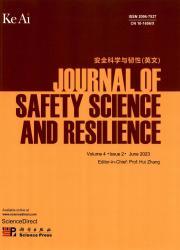Resilience assessment of public health system at multi-levels: An emergency management capacity quantification model for pandemic response
IF 3.4
Q1 PUBLIC, ENVIRONMENTAL & OCCUPATIONAL HEALTH
引用次数: 0
Abstract
Facing the global pandemic of coronavirus disease 2019 (COVID-19), countries and regions have implemented different policies and non-pharmacological interventions (NPIs) according to their circumstances. These policies and intervention measures provide new insights into assessing local resilience from the perspective of response capacities in the public health system. This study aims to establish a multi-dimensional and dynamic resilience assessment model based on the index system method. The complete assessment model includes building a comprehensive system, executing the system in specific scenarios, and measuring resilience. The comprehensive system, like a guideline, is constructed from six key categories. The system involves the entire society, encompassing various levels, including country, state, province, city, local community, and individual. It considers not only policy formulation but also the actual implementation of the policy. The comprehensive system does not necessarily apply to all scenarios during the system's implementation. The actual case, the prevention & control in England, is introduced to assess the local resilience and verify the proposed assessment model. The results prove that our model can be used to assess local resilience for the public health system and seek capacity improvement when responding to epidemic situations.
多层次公共卫生系统弹性评估:大流行应急管理能力量化模型
面对2019冠状病毒病(COVID-19)全球大流行,各国和地区根据自身情况实施了不同的政策和非药物干预措施。这些政策和干预措施为从公共卫生系统应对能力的角度评估当地恢复力提供了新的见解。本研究旨在建立基于指标体系方法的多维动态弹性评价模型。完整的评估模型包括构建一个全面的系统,在特定的场景中执行系统,以及测量弹性。综合体系就像一个指南,由六个关键类别构成。该制度涉及整个社会,包括国家、州、省、市、地方社区和个人等各个层面。它不仅考虑政策的制定,而且考虑政策的实际执行。全面的系统并不一定适用于系统实施过程中的所有场景。实际案例,预防&;,以评估当地的恢复力,并验证所提出的评估模型。结果证明,我们的模型可以用来评估当地公共卫生系统的弹性,并在应对疫情时寻求能力改进。
本文章由计算机程序翻译,如有差异,请以英文原文为准。
求助全文
约1分钟内获得全文
求助全文
来源期刊

安全科学与韧性(英文)
Management Science and Operations Research, Safety, Risk, Reliability and Quality, Safety Research
CiteScore
8.70
自引率
0.00%
发文量
0
审稿时长
72 days
 求助内容:
求助内容: 应助结果提醒方式:
应助结果提醒方式:


